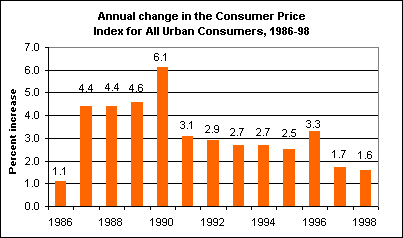An official website of the United States government
 United States Department of Labor
United States Department of Labor
The Consumer Price Index for All Urban Consumers (CPI-U) rose 1.6 percent from December 1997 to December 1998, after advancing 1.7 percent in 1997. This was the smallest increase reported since a 1.1 percent rise in 1986. The CPI-U measures retail price changes for goods and services purchased by consumers in metropolitan areas.

[Chart data—TXT]
The moderate increase in 1998 was largely due to falling energy prices. The energy index declined 8.8 percent in 1998, again the largest drop since 1986. Energy commodities, including gasoline, fell 15.1 percent, and charges for energy services decreased 3.3 percent.
The "core" CPI-U, consumer prices excluding food and energy, rose 2.4 percent in 1998, compared with a 2.2 percent increase in 1997. Sharply higher tobacco prices caused the increase in the core rate.
These data are produced by the BLS Consumer Price Index program. More information can be obtained in news release USDL 99-11, "Consumer Price Indexes, December 1998." Annual comparisons are based on changes in indexes from December 1997 to December 1998.
Bureau of Labor Statistics, U.S. Department of Labor, The Economics Daily, Annual consumer price rise smallest since 1986 at https://www.bls.gov/opub/ted/1999/jan/wk2/art05.htm (visited March 04, 2026).

Recent editions of Spotlight on Statistics
